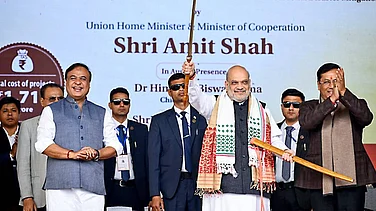After a quick analysis of the Karnataka election results, it appears that the constituencies where there was a high degree of communal polarisation did not follow the broader trend of Congress gains.
Despite the Congress party’s significant victory, it did not make much headway in the state’s coastal belt, which is often referred to as the ‘Hindutwa laboratory’ of Karnataka. Out of the 19 seats in the three districts of Dakshina Kannada, Uthara Kannada, and Uduppi, Congress is only leading in three which is the same as that of 2018.
While the rest of the state supported Congress and gave the party a thumping majority, the coastal Karnataka region, where the Sangh Parivar unabashedly pushed hardline Hindutva, refused to follow the trend. In constituencies across the coastal region where the Sangh Parivar created communal polarisation, the Bharatiya Janata Party (BJP) won or acquired significant leads.
Uduppi, which was the center of the hijab controversy, is an example of this. Yashpal Anand Suvarna —a Bajrang Dal activist, a cow vigilante, former Akhil Bharatiya Vidyarthi Parishad (ABVP) leader, and general secretary of OBC Morcha— was leading by over 25,000 votes at 12:50 pm, according to the Election Commission (EC). He was the most vocal face of the BJP who sparked the hijab controversy. Suvarna gained national attention by referring to the six students of PU College in Uduppi who moved court as terrorists.
Suvarna first shot into fame in 2005 as the prime accused in a mob attack on a Muslim cattle trader and his son. The incident in which the father and son were harassed for hours and were paraded naked is said to be the beginning of cow vigilantism in Karnataka.
In the Moodabidri constituency, where Muslim traders were banned from Hindu temple festivals, the BJP has a comfortable lead. In the first week of April, the temple committee imposed a ban on Muslim traders from putting up stalls at the Bappanadu temple fair in Mulki in the Moodabidri constituency in Dakshina Kannada district, allegedly based on a complaint raised by the locals, who also demanded the ban on Muslim traders. This decision was a continuation of the ban imposed last year. Muslim traders were not allowed to put up stalls across 60 temple festivals in coastal Karnataka in 2022.
In Sullia, another constituency in Dakshina Kannada that experienced severe communal turmoil last year, followed by the murder of a local BJP leader, the party is set to win with a thumping majority as it is leading by over 28,000 votes, as per the latest data published by EC.
Praveen Nettaru, a Yuva Morcha leader, was hacked to death in the wee hours of July 26, 2022 at Sullia allegedly by Popular Front of India (PFI) activists. This was suspected to be retaliation for another murder in Bellare, that of a PFI man, according to the police. The Vishva Hindu Parishad (VHP) called for a bandh in Sullia taluk and shops and commercial establishments remained closed for a few days at the time. Tensions continued for several weeks, further widening the already-existing communal divide in the locality.
Mangalore is the only consolation for Congress, where the former Minister U T Khader achieved a shining victory with a margin of around 17,000 votes, securing 51 per cent of the total votes polled, according to data published by EC at 1:30 pm. Khader emerged victorious in 2018 too when the BJP made a clean sweep across the coastal belt, leaving only three seats for Congress.
In democracy, elections always bring surprises. This time, Kodagu district, which also lies in the coastal area, made a huge shift by giving clear leads to Congress in both the constituencies of Virajpet and Madikkeri. M P Appachu Ranjan, three-time MLA and a powerful BJP leader from Kodagu, is trailing by more than 4,500 votes after 16 rounds of counting. In Virajpett, sitting MLA, K G Bopaiah of BJP is trailing by more than 5,000 votes.





















